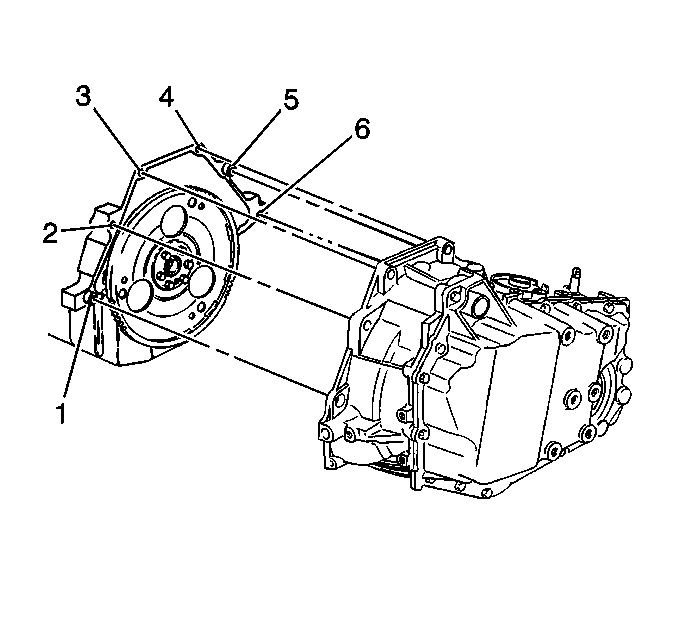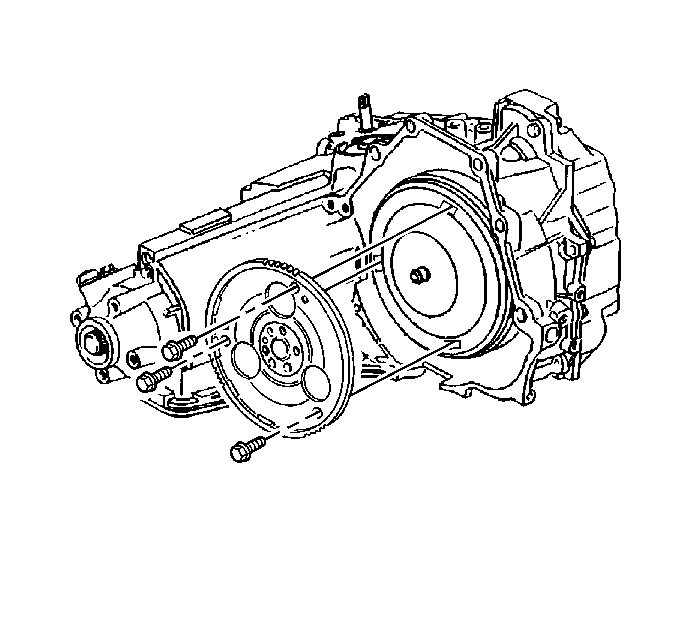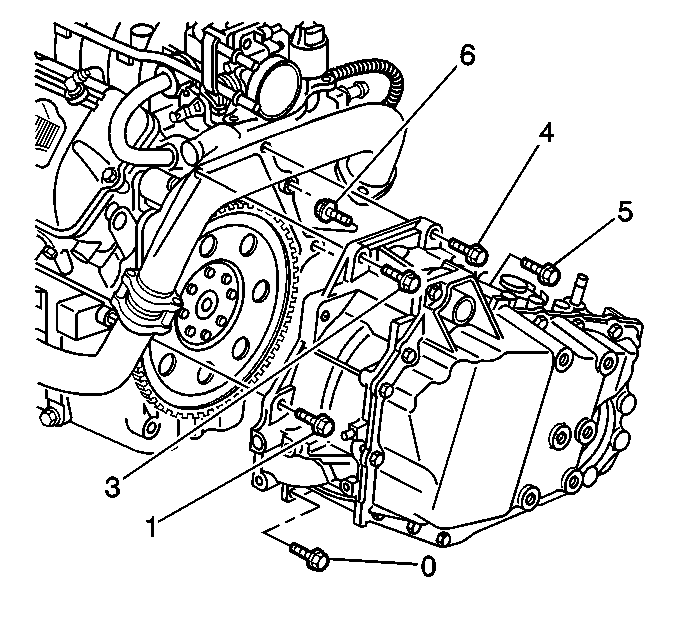Transmission Replacement 3800 L36
Removal Procedure
Caution: Before servicing any electrical component, the ignition and start switch must be in the OFF or LOCK position and all electrical loads must be OFF, unless instructed otherwise in these procedures. If a tool or equipment could easily come in contact with a live exposed electrical terminal, also disconnect the negative battery cable. Failure to follow these precautions may cause personal injury and/or damage to the vehicle or its components.
- Disconnect the battery ground (negative) cable. Refer to Battery Negative Cable Disconnection and Connection in Engine Electrical.
- Remove the throttle body air inlet duct. Refer to Air Cleaner Inlet Duct Replacement in Engine Controls.
- Install the engine support fixture. Refer to Engine Support Fixture .
- Remove the engine mount struts. Refer to Engine Mount Strut Replacement in Engine Mechanical.
- Disconnect the wiring harness connectors from the transaxle. Refer to Harness Routing Views in Engine Electrical.
- Disconnect the automatic transaxle range selector cable from the PNP switch. Refer to Range Selector Lever Cable Replacement .
- Remove the automatic transaxle range selector cable bracket with cable from transaxle. Refer to Range Selector Lever Cable Bracket Replacement .
- Remove the PNP switch. Refer to Range Selector Lever Cable Replacement .
- Remove the fluid filler tube. Refer to Transmission Fluid Filler Tube Replacement .
- Remove the upper transaxle bolts (3, 4 and 5) and stud (2).
- Remove the wiring harness grounds.
- Raise and support the vehicle. Refer to Lifting and Jacking the Vehicle in General Information.
- Remove the front tires and wheels. Refer to Tire and Wheel Removal and Installation in Tires and Wheels.
- Remove the engine splash shields. Refer to Engine Splash Shield Replacement in Body Front End.
- Remove both tie rod ends from the steering knuckles. Refer to Steering Knuckle Replacement in Front Suspension.
- Remove the power steering gear from the frame. Refer to Steering Gear Replacement in Power Steering System.
- Use wire to secure the power steering gear to the vehicle.
- Remove the power steering cooler line clamps from the frame.
- Remove the engine mount lower nuts. Refer to Engine Mount Replacement in Engine Mechanical.
- Remove the lower ball joints from the steering knuckles. Refer to Steering Knuckle Replacement in Front Suspension.
- Remove the torque converter cover. Refer to Torque Converter Cover Replacement .
- Remove the starter motor. Refer to Starter Motor Replacement in Engine Electrical.
- Remove the torque converter bolts.
- Drain the transaxle fluid.
- Disconnect the transaxle oil cooler hoses from the transaxle. Refer to Automatic Transmission Oil Cooler Hose Replacement .
- Disconnect the drive axles from the transaxle. Refer to Wheel Drive Shaft Replacement in Drive Axle.
- Secure the drive axles to the steering knuckle and struts.
- Disconnect the wheel speed sensors wiring harness connectors. Refer to Wheel Speed Sensor Jumper Harness Replacement in ABS.
- Disconnect the vehicle speed sensor wiring harness connector. Refer to Vehicle Speed Sensor Replacement .
- Use the transaxle table to support the transaxle and frame.
- Remove the transaxle brace. Refer to Transmission Brace Replacement .
- Remove the lower transaxle bolt (6) and stud (1).
- Remove the frame to body bolts. Refer to Frame Removal in Frame and Underbody.
- Separate the engine from the transmission.
- Lower the transaxle and frame from the vehicle.
- Remove the transaxle from the frame to the bench. Refer to the Transmission/Transaxle/Transfer Case Unit Repair Manual.
- Refer to Transmission/Transaxle/Transfer Case Unit Repair Manual for the inspection procedure and for the overhaul procedure.
- Flush the transmission cooler and lines whenever the transaxle is removed for overhaul or whenever the torque converter pump or the case is replaced. Refer to Transmission Fluid Cooler Flushing and Flow Test .



Installation Procedure
- Install the transaxle to the frame on the transaxle table.
- Raise the transaxle and frame assembly to the vehicle.
- Install the frame to body bolts. Refer to Frame Removal in Frame and Underbody.
- Install the lower transaxle bolt (6) and stud (1).
- Install the transaxle brace. Refer to Transmission Brace Replacement .
- Remove the transaxle table.
- Connect the vehicle speed sensor wiring harness connector. Refer to Vehicle Speed Sensor Replacement .
- Connect the wheel speed sensors wiring harness connectors. Refer to Wheel Speed Sensor Jumper Harness Replacement in ABS.
- Connect the drive axles to the transaxle. Refer to Wheel Drive Shaft Replacement in Drive Axle.
- Connect the transaxle oil cooler hoses to the transaxle. Refer to Automatic Transmission Oil Cooler Hose Replacement .
- Install the torque converter bolts.
- Install the starter motor. Refer to Starter Motor Replacement in Engine Electrical.
- Install the torque converter cover. Refer to Torque Converter Cover Replacement .
- Install the lower ball joints to the steering knuckles. Refer to Steering Knuckle Replacement in Front Suspension.
- Install the engine mount lower nuts. Refer to Engine Mount Replacement in Engine Mechanical.
- Install the power steering cooler line clamps to the frame.
- Install the power steering gear to the frame. Refer to Steering Gear Replacement in Power Steering System.
- Install both the tie rod ends to the steering knuckles. Refer to Steering Knuckle Replacement in Front Suspension.
- Install the engine splash shields. Refer to Engine Splash Shield Replacement in Body Front End.
- Install the front tires and wheels. Refer to Tire and Wheel Removal and Installation in Tires and Wheels.
- Install the fluid filler tube. Refer to Transmission Fluid Filler Tube Replacement .
- Remove the vehicle support.
- Lower the vehicle.
- Install the upper transaxle bolts (3, 4 and 5) and stud (2). and install the wiring harness grounds.
- Install the PNP switch. Refer to Range Selector Lever Cable Replacement .
- Install the automatic transaxle range selector cable bracket with cable to transaxle. Refer to Range Selector Lever Cable Bracket Replacement .
- Connect the automatic transaxle range selector cable to the PNP switch. Refer to Range Selector Lever Cable Replacement .
- Install the wiring harness connectors to the transaxle. Refer to Harness Routing Views in Engine Electrical.
- Install the engine mount struts. Refer to Engine Mount Strut Replacement in Engine Mechanical.
- Remove the engine support fixture. Refer to Engine Support Fixture .
- Install the throttle body air inlet duct. Refer to Air Cleaner Inlet Duct Replacement in Engine Controls.
- Connect the battery ground (negative) cable. Refer to Battery Negative Cable Disconnection and Connection in Engine Electrical.
- Adjust the toe-in, if required. Refer to Front Toe Adjustment in Wheel Alignment.
- Adjust the fluid level. Refer to Transmission Fluid Check .
- Use the J 35944-A or equivalent to flush the following components whenever the transaxle is removed for overhaul or whenever the torque converter pump or the case is replaced:
- Inspect for proper completion of the repairs.
- Inspect for fluid leaks.
Notice: Refer to Fastener Notice in the Preface section.

Tighten
Tighten the lower transaxle to engine and engine to transaxle bolts to 75 N·m
(55 lb ft).

Tighten
Tighten the torque converter bolts to 63 N·m (46 lb ft).

Tighten
Tighten the upper transaxle bolts (3, 4 and 5) and stud (2) to
75 N·m (55 lb ft).
Notice: Do NOT overfill the transaxle. The overfilling of the transaxle causes foaming, loss of fluid, shift complaints, and possible damage to the transaxle.
| • | Flush the transaxle oil cooler(s). |
| • | Flush the hoses. |
| • | Flush the pipes. |
| • | Refer to Transmission Fluid Cooler Flushing . |
Transmission Replacement 3.5L Twin Cam V6 LX5
Removal Procedure
Caution: Before servicing any electrical component, the ignition and start switch must be in the OFF or LOCK position and all electrical loads must be OFF, unless instructed otherwise in these procedures. If a tool or equipment could easily come in contact with a live exposed electrical terminal, also disconnect the negative battery cable. Failure to follow these precautions may cause personal injury and/or damage to the vehicle or its components.
- Disconnect the battery ground (negative) cable. Refer to Battery Negative Cable Disconnection and Connection in Engine Electrical.
- Remove the throttle body air inlet duct. Refer to Air Cleaner Inlet Duct Replacement in Engine Controls - 3.5L.
- Install the engine support fixture. Refer to Engine Support Fixture .
- Remove the engine mount strut. Refer to Engine Mount Strut Replacement in Engine Mechanical - 3.5L.
- Disconnect the wiring harness connectors from the transaxle. Refer to Harness Routing Views in Engine Electrical.
- Disconnect the automatic transaxle range selector cable from the PNP switch. Refer to Range Selector Lever Cable Replacement .
- Remove the automatic transaxle range selector cable bracket with cable from transaxle. Refer to Range Selector Lever Cable Bracket Replacement .
- Remove the PNP switch. Refer to Park/Neutral Position Switch Replacement .
- Remove the fluid filler tube. Refer to Transmission Fluid Filler Tube Replacement .
- Remove the upper transaxle bolts.
- Remove the wiring harness grounds.
- Raise and support the vehicle. Refer to Lifting and Jacking the Vehicle in General Information.
- Remove the front tires and wheels. Refer to Tire and Wheel Removal and Installation in Tires and Wheels.
- Remove the engine splash shields. Refer to Engine Splash Shield Replacement in Body Front End.
- Remove both tie rod ends from the steering knuckles. Refer to Steering Knuckle Replacement in Front Suspension.
- Remove the power steering gear from the frame. Refer to Steering Gear Replacement in Power Steering System.
- Use wire to secure the power steering gear to the vehicle.
- Remove the power steering cooler line clamps from the frame.
- Remove the engine mount lower nuts. Refer to Engine Mount Replacement in Engine Mechanical - 3.5L.
- Remove the lower ball joints from the steering knuckles. Refer to Steering Knuckle Replacement in Front Suspension.
- Remove the torque converter cover. Refer to Torque Converter Cover Replacement .
- Remove the starter motor. Refer to Starter Motor Replacement in Engine Electrical.
- Remove the torque converter bolts.
- Drain the transaxle fluid.
- Disconnect the transaxle oil cooler hoses from the transaxle. Refer to Automatic Transmission Oil Cooler Hose Replacement .
- Disconnect the drive axles from the transaxle. Refer to Wheel Drive Shaft Replacement in Drive Axle.
- Secure the drive axles to the steering knuckle and struts.
- Disconnect the wheel speed sensors wiring harness connectors. Refer to Wheel Speed Sensor Jumper Harness Replacement In ABS.
- Disconnect the vehicle speed sensor wiring harness connector. Refer to Vehicle Speed Sensor Replacement .
- Use the transaxle table to support the transaxle and frame.
- Remove the right (rear) engine mount. Refer to Engine Mount Replacement .
- Remove the right (rear) engine mount bracket. Refer to Engine Mount Bracket Replacement .
- Remove the transaxle brace. Refer to Transmission Brace Replacement .
- Remove the lower transaxle bolts.
- Remove the frame to body bolts. Refer to Frame Removal in Frame and Underbody.
- Separate the engine from the transmission.
- Lower the transaxle and frame from the vehicle.
- Remove the transaxle from the frame to the bench. Refer to the Transmission/Transaxle/Transfer Case Unit Repair Manual.
- Refer to Transmission/Transaxle/Transfer Case Unit Repair Manual for the inspection procedure and for the overhaul procedure.
- Flush the transmission cooler and lines whenever the transaxle is removed for overhaul or whenever the torque converter pump or the case is replaced. Refer to Transmission Fluid Cooler Flushing and Flow Test .

Important: The transaxle/engine bolts must be returned to their original position. The bolt installed in position number (5) is two millimeters shorter then the other transaxle/engine bolts and requires the use of thread sealant. The bolt installed in position number (3) has a special pilot point.


Important: The transaxle/engine bolts must be returned to their original position. The bolt installed in position number 5 is two millimeters shorter then the other transaxle/engine bolts and requires the use of thread sealant. The bolt installed in position number (3) has a special pilot point.
Installation Procedure
- Install the transaxle to the frame on the transaxle table.
- Raise the transaxle and frame assembly to the vehicle.
- Install the frame to body bolts. Refer to Frame Removal in Frame and Underbody.
- Install the lower transaxle bolts into positions 0, 1,3,4, 5 and 6.
- Install the transaxle brace. Refer to Transmission Brace Replacement .
- Install the right (rear) engine mount bracket. Refer to Engine Mount Bracket Replacement .
- Install the right (rear) engine mount. Refer to Engine Mount Replacement .
- Remove the transaxle table.
- Connect the vehicle speed sensor wiring harness connector. Refer to Vehicle Speed Sensor Replacement .
- Connect the wheel speed sensors wiring harness connectors. Refer to Wheel Speed Sensor Jumper Harness Replacement in ABS.
- Connect the drive axles to the transaxle. Refer to Wheel Drive Shaft Replacement in Drive Axle.
- Connect the transaxle oil cooler hoses to the transaxle. Refer to Automatic Transmission Oil Cooler Hose Replacement .
- Install the torque converter bolts.
- Install the starter motor. Refer to Starter Motor Replacement in Engine Electrical.
- Install the torque converter cover. Refer to Torque Converter Cover Replacement .
- Install the lower ball joints to the steering knuckles. Refer to Steering Knuckle Replacement in Front Suspension.
- Install the engine mount lower nuts. Refer to Engine Mount Replacement in Engine Mechanical - 3.5L.
- Install the power steering cooler line clamps to the frame.
- Install the power steering gear to the frame. Refer to Steering Gear Replacement in Power Steering System.
- Install both the tie rod ends to the steering knuckles. Refer to Steering Knuckle Replacement in Front Suspension.
- Install the engine splash shields. Refer to Engine Splash Shield Replacement in Body Front End.
- Install the front tires and wheels. Refer to Tire and Wheel Removal and Installation in Tires and Wheels.
- Install the fluid filler tube. Refer to Transmission Fluid Filler Tube Replacement .
- Remove the vehicle support.
- Lower the vehicle.
- Install the upper transaxle bolts into positions 3 and 4.
- Install the PNP switch. Refer to Range Selector Lever Cable Replacement .
- Install the automatic transaxle range selector cable bracket with cable to transaxle. Refer to Range Selector Lever Cable Bracket Replacement .
- Connect the automatic transaxle range selector cable to the PNP switch. Refer to Range Selector Lever Cable Replacement .
- Install the wiring harness connectors to the transaxle. Refer to Harness Routing Views in Engine Electrical.
- Install the engine mount strut. Refer to Engine Mount Strut Replacement in Engine Mechanical - 3.5L.
- Remove the engine support fixture. Refer to Engine Support Fixture .
- Install the throttle body air inlet duct. Refer to Air Cleaner Inlet Duct Replacement in Engine Controls - 3.5L.
- Connect the battery ground (negative) cable. Refer to Battery Negative Cable Disconnection and Connection in Engine Electrical.
- Adjust the toe-in, if required. Refer to Front Toe Adjustment in Wheel Alignment.
- Adjust the fluid level. Refer to Transmission Fluid Check .
- Use the J 35944-A or equivalent to flush the following components whenever the transaxle is removed for overhaul or whenever the torque converter pump or the case is replaced:
- Inspect for proper completion of the repairs.
- Inspect for fluid leaks.
Notice: Refer to Fastener Notice in the Preface section.

Important: The transaxle/engine bolts must be returned to their original position. The bolt installed in position number 5 is two millimeters shorter then the other transaxle/engine bolts and requires the use of thread sealant. The bolt installed in position number (3) has a special pilot point.
Tighten
Tighten the lower transaxle to engine bolts at position 0,1, and 2 and
engine to transaxle bolt at position 6 to 75 N·m (55 lb ft).
Tighten
Tighten the lower transaxle to engine bolt at position 5 to 50 N·m
(36 lb ft).

Tighten
Tighten the torque converter bolts to 63 N·m (46 lb ft).

Important: The transaxle/engine bolts must be returned to their original position. The bolt installed in position number 5 is two millimeters shorter then the other transaxle/engine bolts and requires the use of thread sealant. The bolt installed in position number (3) has a special pilot point.
Tighten
Tighten the upper transaxle bolts at positions 3 and 4 to 75 N·m
(55 lb ft).
Notice: Do NOT overfill the transaxle. The overfilling of the transaxle causes foaming, loss of fluid, shift complaints, and possible damage to the transaxle.
| • | Flush the transaxle oil cooler(s). |
| • | Flush the hoses. |
| • | Flush the pipes. |
| • | Refer to Transmission Fluid Cooler Flushing . |
